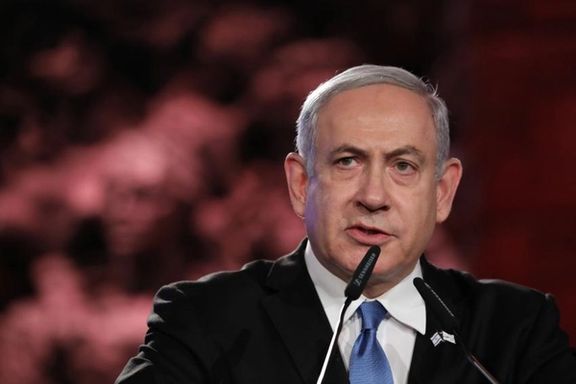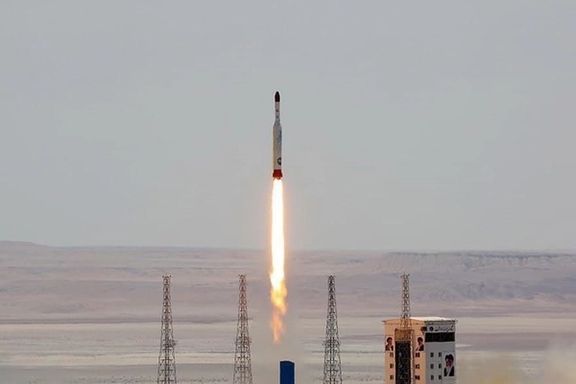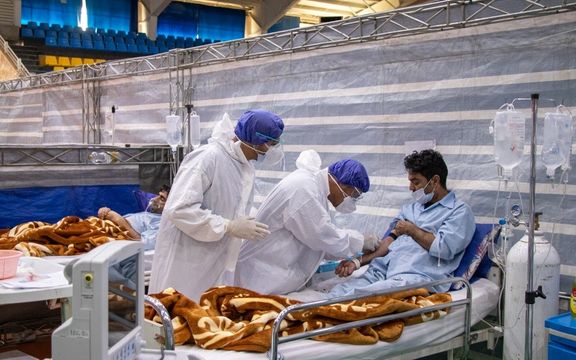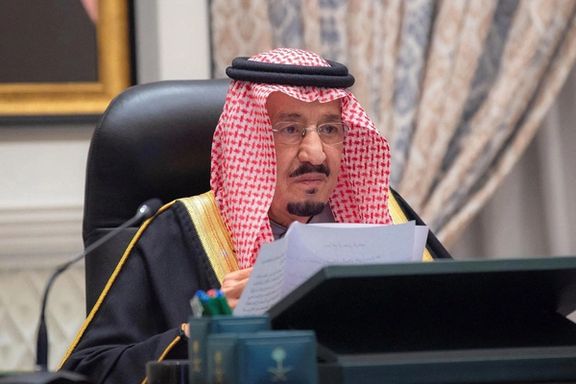Netanyahu Berates Bennett Over Iran

In his latest spat with current premier Naftali Bennett, former Israeli Prime Minister Benjamin Netanyahu has attacked his rival’s approach to Iran and the Vienna nuclear talks.

In his latest spat with current premier Naftali Bennett, former Israeli Prime Minister Benjamin Netanyahu has attacked his rival’s approach to Iran and the Vienna nuclear talks.
Bennett said on Tuesday that Israel would not automatically oppose any agreement reached between Iran and world powers in Vienna. “We are not automatic naysayers. We’re taking a practical approach… Unlike others, we’re not looking to fight for the sake of fighting; rather, we’re trying to bring a result.”
The commitment by the United States administration of President Joe Biden to work to revive the 2015 Iran nuclear deal wrong-footed Israel, which opposed the agreement and is widely held responsible for cyber and military attacks on Iran’s nuclear sites. Bennett, who replaced Netanyahu in June, has reportedly felt a cold shoulder from Biden.
In December Bennett urged world powers to take a far harder line against Tehran in Vienna, telling the Israeli cabinet that Iran “cannot enrich uranium and negotiate at the same time” and “must begin to pay a price for its violations.”

Iran announced Thursday a rocket launch carrying three research devices amid nuclear talks with world powers, although it was unclear if any reached orbit.
Ahmed Hosseini, a defense ministry spokesman, said the ‘Simorgh’ satellite-carrier rocket had set the three devices at 470 kilometers (290 miles) altitude. "The intended research objectives of this launch were achieved," he said, in comments broadcast on state television. "This was done as a preliminary launch ... God willing, we will have an operational launch soon."
Iran, which has one of the widest missile programs in the Middle East, has suffered several failed satellite launches in recent years due to technical issues.
The launch came with negotiations continuing in Vienna to revive Iran’s 2015 nuclear agreement with world powers, the JCPOA (Joint Comprehensive Plan of Action). Some foreign observers and governments have argued that Iran's space program is a cover for testing of ballistic missiles.
Israel and the United States have said it contravenes United Nations Security Council resolution 2231, which in endorsing the JCPOA banned Iran from “any activity related to ballistic missiles designed to be capable of delivering nuclear weapons.” Washington left the JCPOA in 2018, imposing ‘maximum pressure sanctions’ on Iran.
Similar previous launches were criticized by the US. There has been speculation that Thursday’s launch might be a message, for audiences foreign and domestic, that Iran is negotiating from strength in Vienna and will not accept demands that it unliterally scale back its missile program. Iranian strategists believe missile defense is needed to counterbalance the threat of advanced mainly US-supplied strike aircraft held by Israel and the Arab Gulf states.
Simorgh − named after a mythical bird, similar to the phoenix, that was the emblem of the Sassanian dynasty (224-642AD) and remains a national symbol − is a larger orbital launcher than previous models but all are expendable small-capacity orbital space launch vehicles.
Simorgh is also called Safir-2, following the Safir launcher that in February 2009 placed the Omid satellite into an orbit with a 245.2km apogee. In April 2020 Qassed lifted Iran's first military satellite, dubbed Noor, into orbit, with its initial stage propelled by a Ghadr medium-range ballistic missile.
In mid-December, Issa Zarepour, Iran’s communication minister promised “good news” over launching a satellite in March, after reports of preparations at a launch site following a series of setbacks with failed launches.
Zarepour said Iran’s space program had been put on the backburner during President Hassan Rouhani’s eight-year administration (2013-21), but was now to have its budget enhanced. The draft budget of President Ebrahim Raisi for fiscal year 2022-23, which is still to be approved by parliament, would increase the allocation for Iran’s space program by a factor of 12.
The Centre for Strategic and International Studies argued in a 2018 report that “neither the Arab states nor Iran provide anything resembling credible reporting on their military expenditures and arms transfers.”

Iran’s chief negotiator at the Vienna nuclear talks met Thursday with the three European participants in the 2015 nuclear deal, before negotiations take a New Year recess.
The Islamic Republic News Agency (IRNA) reported the meeting saying that the European Union representative at the talks Enrique Mora also took part in the meeting with diplomats from the United Kingdom, France and Germany.
Negotiations began in April to revive the Joint Comprehensive Plan of Action, or JCPOA, to bring the United States back into the agreement after former US president Donald Trump withdrew from the deal saying it was inadequate to prevent Iran from acquiring nuclear weapons.
IRNA reiterated recent optimism expressed by Tehran and Moscow about the chances of an eventual agreement, although the United States and the European troika (E3) have been guarded regarding Iran’s conduct in the negotiations, demanding a faster process.
World powers remaining in the agreement, Russia, China and the E3, met with US representatives in Vienna on Wednesday. The US is not directly participating in the formal JCPOA meetings but is in essence negotiating with Iran through its European allies.

The Omicron variant of the coronavirus has spread in a dozen Iranian provinces, bringing confirmed cases to 43, the health ministry announced on Thursday.
The head of Iran’s taskforce to combat coronavirus, Hamid Souri, has said that the PCR tests Iran uses may not be enough to detect the new variant.
World Health Organization Director-General Tedros Adhanom Ghebreyesus has warned that Omicron could lead to a “tsunami” of Covid-19 cases, because it is more transmissible and is circulating around the globe at the same time as the Delta variant.
Iran was the second country after China where the coronavirus spread in in early 2020 and Covid-19 became an epidemic, but the government was slow to admit the crisis and act to contain it, leading to the worst Covid crisis in the Middle East.
Iran has announced that it has closed all its land and sea borders to non-Iranians for 15 days, but air travel is still ongoing except from eight African and four European countries, namely England, France, Norway and Denmark.
A senior official of Iran’s national Coronavirus headquarters says the new variant will be the dominant type of Covid-19 in Iran in the coming weeks.
Iran, which confirmed the first Omicron case on Sunday, December 19, is one of the worst hit countries in the region by more than 131,000 officially announced deaths since February 2020.

Saudi Arabia's King Salman has expressed concern about Iran's lack of cooperation with the international community on its nuclear and ballistic missile programs.
King Salman bin Abdulaziz said in an address to the kingdom's advisory Shura Council on Wednesday that he hoped Iran would change its "negative" behavior in the region and choose dialogue and cooperation.
"We follow with concern the Iranian government’s policy which is destabilizing regional security and stability, including building and backing sectarian armed militias and propagating its military power in other countries," the 85-old ruler said in a speech published by state news agency SPA.
"(We follow with concern) its lack of cooperation with the international community regarding its nuclear program and its development of ballistic missiles," he added.
Saudi Arabia, a major Western ally in the Gulf, has been locked in a bitter rivalry with Iran across the Middle East where both sides have backed opposing factions in several conflicts including in Yemen, Syria and Lebanon.
The two countries broke diplomatic ties in early 2016 when mobs in Iran attacked and ransacked the Saudi embassy.
In a step to ease tensions, Saudi and Iranian officials met in a series of direct talks earlier this year but they have yet to yield a breakthrough.

The Russian envoy to the Iran nuclear talks said Wednesday that he had met with his US counterpart in Vienna, where the eighth round of talks is taking place.
Russia's Mikhail Ulyanov wrote on Twitter that he had met with the US special envoy to Iran, Robert Malley.
"Close consultations and coordination between the Russian and the U.S. delegations in the course of the Vienna talks constitute an important prerequisite for progress towards restoration of the JCPOA," he wrote.
Ulyanov also tweeted, that world powers which are patricipants in the JCPOA and the United States met Wednesday evening without Iran and "noted with satisfaction positive trens" in the talks.
The talks are about reviving the Joint Comprehensive Plan of Action (JCPOA) by bringing the United States back into the deal through sanctions lifting, and Iran through full implementation of its nuclear commitments.
The United States on Tuesday expressed caution over upbeat comments by Iran and Russia about talks in Vienna to salvage the 2015 Iran nuclear deal, saying it was too soon to say if Tehran had returned to the negotiations with a constructive approach.
With reporting by Reuters